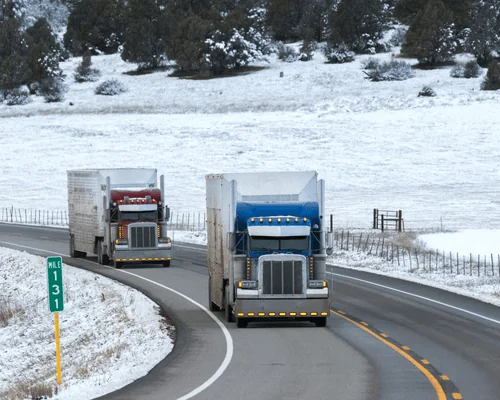
Emergency Freight Regulations & Securing A Logistic Plan
Explore the significance of emergency freight transportation regulations and the crucial role of secure logistics planning in supply chain resilience.
In an era where resilience is the key to survival, let us explore how businesses can adapt, comply, and thrive in the face of adversity.
In today’s interconnected world, the efficient flow of goods and materials is the lifeblood of businesses and economies. Yet, the global supply chain is not immune to disruptions. Natural disasters, geopolitical tensions, pandemics, and economic fluctuations can all send shockwaves through the logistics network, jeopardizing the timely delivery of critical goods.
Ensuring Supply Chain Resilience
The face of these challenges, the importance of emergency freight transportation regulations, and the need for a secure logistics plan have never been more evident. This webpage delves into the critical intersection of these two elements, shedding light on how businesses can navigate the complexities of supply chain disruptions and emerge more resilient than ever.
Join us on a journey through the world of emergency freight transportation regulations and discover the indispensable role of a secure logistics plan. As we explore the intricacies of compliance, the impact of disruptions, and the best practices for preparedness, you’ll gain valuable insights into safeguarding your operations and ensuring the continuity of your supply chain during times of uncertainty.
We provide competitive freight shipping prices and an all-inclusive, easy-to-use shipping experience for our customers. Exceeding our customers’ expectations results in thousands of satisfied customer reviews and repeat business. We believe in the power of our customer relationships. Check out FreightCenter reviews from real customers, and learn what they have to say about their freight shipping experience!
- 2021, 2017 & 2016 Food Logistics’ Top Green Providers
- 2021 & 2018 Supply & Demand Chain Executives’ Pros to Know: Matthew Brosious
- 2020 & 2019 Top Food Logistics’ 3PL & Cold Storage Provider Award
- 2020 & 2019 Business Observer’s Top 500 Companies on the Gulf Coast
- 2020 & 2017 SmartWay® Transport Partner
- 2020 & 2017 Food Logistics’ Champions: Rock Stars of the Supply Chain
- 2020 Best of Palm Harbor Awards for Local Businesses
- 2017 Green Supply Chain Award from Supply & Demand Chain Executive
- 2017 Tampa Bay Business Journal Heroes at Work
- 2016, 2015, & 2012 Food Logistics Top 100 Software and Technology Providers
- 2013 Tampa Bay Business 100 by Tampa Bay Business Journal
- 2013 Top 100 Great Supply Chain Partners by SupplyChainBrain
- 2012 TIA Samaritan Award Honorable Mention
- 2012, 2011 & 2010 TBBJ Fast 50 Recipient
- 2013, 2011, & 2010 Diversity Business Top Businesses

Ensuring Continuity with FreightCenter
Choosing the right partner is paramount when securing your supply chain and ensuring its resilience. FreightCenter stands as a beacon of reliability and innovation in logistics. Here’s why selecting FreightCenter is your best decision for safeguarding your business against disruptions:
Expertise and Experience: With over two decades of experience, FreightCenter has honed its expertise in navigating the complexities of the supply chain. Their team of professionals brings extensive knowledge, offering invaluable insights into secure logistics planning and supply chain resilience.
Tailored Solutions: FreightCenter understands that each business is unique, and there is no one-size-fits-all solution for secure logistics. They work closely with you to craft tailored strategies that address your vulnerabilities, ensuring your supply chain remains robust.
Diverse Carrier Network: FreightCenter boasts a vast network of carriers, providing many transportation options. This diversity ensures flexibility in your supply chain operations, even in disruptions.
Cutting-Edge Technology: Embracing the latest technologies, FreightCenter offers tools and platforms that enhance visibility and streamline your logistics operations. Their technological advancements empower your business to adapt swiftly to changing circumstances.
Resilience and Growth: FreightCenter doesn’t just focus on survival; it empowers your business to thrive amid challenges. Their partnership goes beyond logistics; it’s about cultivating a culture of resilience and innovation within your organization.
Understanding Emergency Freight Transportation Regulations
-
Navigating the Complex Web of Regulations
In the intricate landscape of modern logistics, one cannot overstate the importance of adherence to emergency freight transportation regulations. These regulations serve as the guiding principles that govern the movement of goods during times of crisis and uncertainty.
But what exactly do these regulations entail, and why are they so crucial? In this section, we journeyed to unravel the intricacies of emergency freight transportation regulations, shedding light on their significance in maintaining supply chain resilience.
-
Defining Emergency Freight Transportation Regulations
Emergency freight transportation regulations, at its core, encompass a set of rules, guidelines, and standards established by government agencies to ensure the safe and efficient movement of goods during emergencies. These emergencies can encompass a wide spectrum, from natural disasters like hurricanes and earthquakes to pandemics and unforeseen geopolitical events.
-
Variability Across Regions
One of the notable aspects of these regulations is their variability. Emergency freight transportation regulations are not uniform across regions or countries. Each geographical area may have its own set of rules and protocols, adding a layer of complexity for businesses operating on a global scale. Understanding these regional nuances is crucial for companies seeking to maintain compliance and ensure the continuity of their supply chains.
-
Government Agencies as Guardians
Government agencies play a pivotal role in enforcing and overseeing these regulations. Their task is twofold: to safeguard the public’s welfare during emergencies and to facilitate the efficient movement of essential goods. This dual responsibility requires agencies to strike a delicate balance between regulatory enforcement and flexibility, ensuring that the supply chain remains resilient despite adversity.
As we delve deeper into this realm of regulations, we’ll explore the mechanisms that drive compliance, the consequences of non-compliance, and the strategies businesses can employ to navigate this intricate web of rules. Join us as we unravel the first layer of the critical intersection between emergency freight transportation regulations and supply chain resilience.

The Impact of Disruptions in the Supply Chain
-
The Unpredictable Nature of Disruptions
In the world of logistics, unpredictability is a constant companion. Supply chains are susceptible to an array of disruptions that can arise suddenly, from natural disasters to global health crises and economic fluctuations. These disruptions can send shockwaves through the intricate network of suppliers, carriers, and consumers, causing delays, shortages, and financial losses.
-
Real-World Examples
To grasp the gravity of supply chain disruptions, examining real-world examples is essential. Consider a hurricane that strikes a significant port, halting the flow of imported goods, or a pandemic that disrupts manufacturing and transportation networks, causing global supply shortages. These scenarios illustrate the far-reaching consequences of unforeseen events, highlighting the vulnerability of modern supply chains.
-
The Ripple Effect
One of the defining features of supply chain disruption ns is the ripple effect. A disruption in one part of the supply chain can reverberate throughout the entire network, affecting multiple industries and regions. For instance, a factory closure due to a natural disaster can lead to a shortage of critical components, impacting the production of various products far beyond the affected area.
Supply chain disruptions come at a considerable cost. Downtime resulting from disruptions can lead to financial losses, damage to brand reputation, and customer dissatisfaction. Moreover, the longer it takes to recover and resume operations, the more profound the impact on a business’s bottom line.
-
The Need for Preparedness
The undeniable truth is that disruptions are not a matter of “if” but “when.” Acknowledging this reality underscores the critical importance of preparedness. Companies that proactively plan for supply chain disruptions are better equipped to navigate the challenges they present. This preparedness extends beyond reactive measures and dives into proactive strategies, including secure logistics planning.
In this section, we’ve explored supply chain disruptions’ unpredictable nature, real-world consequences, and the ripple effect that affects industries and regions. As we move forward, we’ll delve deeper into the role of a secure logistics plan in mitigating these challenges, highlighting how proactive measures can transform the impact of disruptions from debilitating to manageable.
Explore the significance of emergency freight transportation regulations and the crucial role of secure logistics planning in supply chain resilience.
Rail shipping is a cost-effective and environmentally friendly transportation method that utilizes trains to move goods over long distances. It's known for its efficiency in handling large volumes of cargo, making it a sustainable and economical choice for businesses seeking reliable freight transport options.
Expedited shipping is a premium service designed to meet urgent delivery needs. It prioritizes speed and quick turnaround, ensuring that packages or goods reach their destination faster than standard shipping options. Expedited shipping is the go-to choice when time-sensitive deliveries are essential, providing businesses and individuals with reliable and prompt service for critical shipments.
White glove shipping is a premium service that goes beyond standard delivery, offering meticulous handling, specialized packaging, and in-home setup or installation for valuable or delicate items, ensuring a seamless and hassle-free experience for customers.
Flatbed shipping is a versatile and essential mode of freight transportation, characterized by its open trailer design that accommodates oversized, irregularly shaped, or heavy cargo. It provides a flexible solution for industries requiring the transportation of goods that cannot fit into standard enclosed trailers, making it a preferred choice for handling construction materials, machinery, and other challenging loads.

Frequently Asked Questions about Emergency Freight Regulations & Securing Logistic Plans
Q. When are emergency freight regulations put in place?
These regulations are typically enacted by government agencies (e.g., the Department of Transportation or FEMA) during declared states of emergency to ensure the swift movement of essential goods. They are temporary and expire once the emergency is resolved.
Q. What types of goods are prioritized during emergencies?
Priority is often given to essential goods, including:
- Medical supplies and equipment
- Food and water
- Fuel and energy resources
- Emergency shelter materials
- Disaster response equipment
Q. Can carriers operate beyond standard hours of service during emergencies?
Yes, emergency declarations often suspend standard hours-of-service regulations, allowing drivers to work longer hours to expedite deliveries. However, safety rules regarding driver fatigue still apply.
Q. What challenges might I face during emergency freight shipments?
- Congested Routes: High demand for transport may lead to delays.
- Limited Resources: Fewer trucks, drivers, or fuel available.
- Regulation Changes: Staying updated on temporary rules is crucial.
- Weather or Disaster Conditions: Navigating damaged infrastructure or adverse weather
Q. Are there penalties for not following emergency freight regulations?
Yes, failing to comply with emergency freight regulations can result in fines, shipment delays, or being barred from participating in relief efforts. Compliance is critical to avoid interruptions.
Q. How can I stay informed about emergency freight regulations?
- Monitor updates from government agencies like FEMA, DOT, and state transportation departments.
- Subscribe to industry newsletters or logistics alerts.
- Maintain open communication with your carriers and logistics partners
Advantages to Utilizing FreightCenter

Emergency Preparedness
With 25 years in the business, we have plenty of experience dealing with emergency situations, from hurricanes and snowstorms, to pandemics and outbreaks. Let FreightCenter tackle those snowstorms, you focus on staying safe!

Personalized Shipping Options
Do you need a reefer trailer to keep your bananas at the right temperature? No problem! Do you need a liftgate? We got you! FreightCenter’s user-friendly online booking allows you to customize your order so your bananas are well cared for at affordable rates you can’t find anywhere else.

Incredible Customer Care
FreightCenter’s professional team is on your side. We’ll guide you through every step in the shipping process, from initial quoting to post-shipment support. We prioritize customer satisfaction and ensure your needs are met 100%. Your bananas are in good hands.

